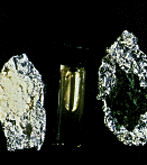A Guide to Drugs and the Brain
Commentary
Drug Effects
Drug Research
Drug Street Names
Back to NFIA
PCP
 PCP
(phencyclidine) was originally developed as an anesthetic for humans and
large animals. Legal (prescription) use of PCP in humans was discontinued
in 1965. It is illegally manufactured in clandestine laboratories and
is sold as tablets, capsules and colored powders. PCP is usually snorted,
smoked or eaten.
PCP
(phencyclidine) was originally developed as an anesthetic for humans and
large animals. Legal (prescription) use of PCP in humans was discontinued
in 1965. It is illegally manufactured in clandestine laboratories and
is sold as tablets, capsules and colored powders. PCP is usually snorted,
smoked or eaten.
"PCP is most commonly sold as a powder (left), or a liquid (center) and applied to a leafy material such as oregano (right) which is then smoked." Drugs of Abuse, 1996 Edition, U.S. Drug Enforcement Administration.
Effects
PCP produces feelings of invulnerability and a numbing effect on the mind
that can often result in anger and rage. At high doses, there is a drop
in blood pressure, pulse rate, and respiration. PCP can cause effects
that mimic certain primary symptoms of schizophrenia.
Common Street
Names
Angel dust, crystal supergrass, killer joints, ozone, wack, rocket fuel.
Legal Status
PCP is a Schedule II drug in the U.S. Controlled Substances Act.
About • Site Map • Privacy
© Copyright 2001 National Families in Action. All rights reserved.
Questions? Write to nfia@nationalfamilies.org.
